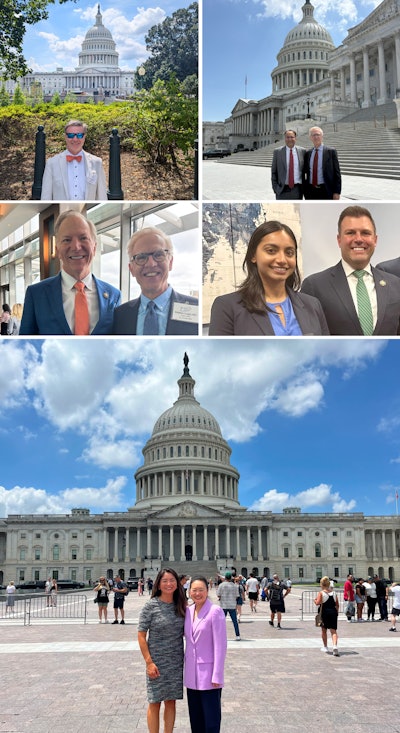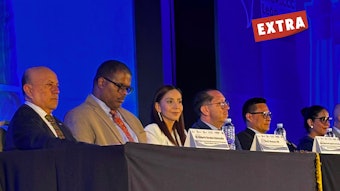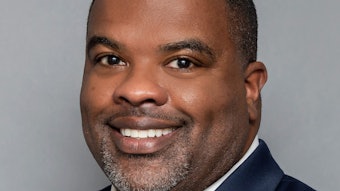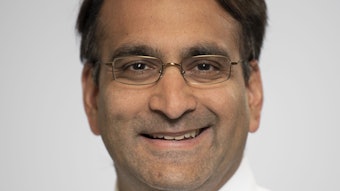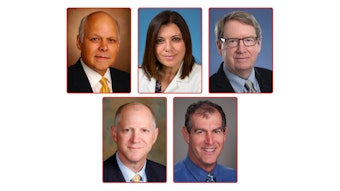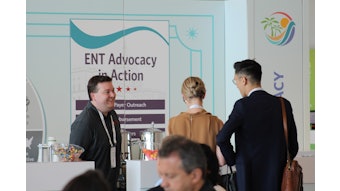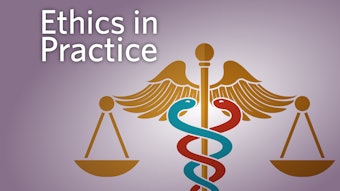Otolaryngology Prominently Represents Specialty on Capitol Hill
Eleven Academy members met with Congress to discuss Medicare reimbursement, prior authorization, Medicare Advantage upcoding, and physician shortages.
Piper Genkin, AAO-HNS Advocacy Intern, and Harry DeCabo, AAO-HNS Director of Advocacy
The Alliance of Specialty Medicine (“The Alliance”), of which the AAO-HNS is a member, recently hosted its annual advocacy conference in Washington, DC. The Alliance is a coalition of national medical societies representing specialty physicians in the United States. This nonpartisan group is dedicated to developing sound federal healthcare policy that fosters patient access to the highest quality specialty care. This year’s conference brought together physicians from a dozen different medical specialties to advocate for the critical issues facing specialty medicine.
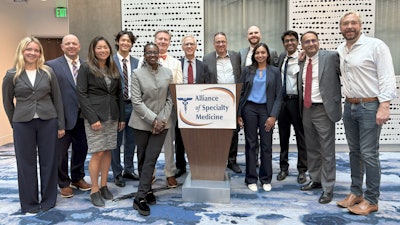 From left to right: Piper Genkin, Brad Gruehn, Mamie Higgins, MD, Hudson Liu, Yolanda Troublefield, MD, JD, Dole Baker, MD, Stephen Cragle, MD, Michale Xydakis, MD, Harry DeCabo, Shriya Airen, MD, Ani Saraswathula, MD, Rahul Shah, MD, MBA, Douglas Reh, MD. Not Pictured: James Oberman, MD
From left to right: Piper Genkin, Brad Gruehn, Mamie Higgins, MD, Hudson Liu, Yolanda Troublefield, MD, JD, Dole Baker, MD, Stephen Cragle, MD, Michale Xydakis, MD, Harry DeCabo, Shriya Airen, MD, Ani Saraswathula, MD, Rahul Shah, MD, MBA, Douglas Reh, MD. Not Pictured: James Oberman, MD
Day One: Expert Insights and Meetings on Capitol Hill
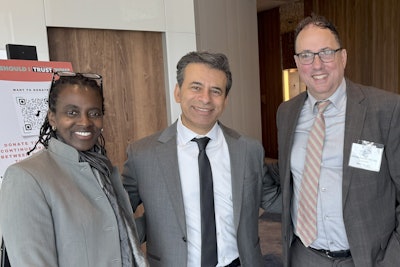 Yolanda Troublefield, MD, JD, and Michael Xydakis, MD, with FDA Commissioner Martin A. Makary, MD, MPH.
Yolanda Troublefield, MD, JD, and Michael Xydakis, MD, with FDA Commissioner Martin A. Makary, MD, MPH.
- U.S. Representative and practicing physician Greg Murphy, MD (R-NC)
- Healthcare expert and journalist Wendell Potter
- Principal Deputy Assistant Secretary for Technology Policy at the Department of Health and Human Services (HHS) Steven Posnack, MS, MHS
- Food and Drug Administration Commissioner Martin. A. Makary, MD, MPH
- Why Should I Trust You? podcast hosts Mark Abdelmalek, MD, and Tom Johnson
The morning speaker sessions were followed by afternoon meetings on Capitol Hill, where Academy members spoke with legislators and their staff about the issues facing otolaryngology and specialty medicine.
Key Policy Priorities
Prior Authorization Reform
Academy members pushed for two critical pieces of legislation. The Improving Seniors’ Timely Access to Care Act (S. 1816/H.R. 3514) seeks to modernize the process and increase transparency. It would set timelines for determinations, require electronic prior authorization submissions, and mandate insurers to publish their prior authorization metrics. The Alliance members also asked for support for the Reducing Medically Unnecessary Delays in Care Act (H.R. 2433), which would ensure prior authorization decisions are made by peers in the same specialty as the requesting physician.
Medicare Payment Reform
With the 2026 Medicare Physician Fee Schedule (MPFS) proposed rule published on July 14, discussions centered on building upon the incoming statutory 2.5% increase in Medicare physician payment. The need for sustainable and stabilizing solutions comes in the context of a long-term decrease in physician payment, compared with inflation, over the past 30 years.
Physicians are the only group in Medicare who do not have an annual inflationary update, and the pot of funds is restricted from growing by policies like budget neutrality. The Alliance members sought support on the Medicare Patient Access and Practice Stabilization Act (H.R. 879/S.1640), both to reverse the 2.83% cut for 2025 that took effect January 1, and to signal future willingness to combat this long-term issue.
Medicare Advanta Upcoding
“Upcoding” occurs when Medicare Advantage plans tack on or exaggerate diagnoses to make enrollees appear sicker, thereby inflating their risk scores and drawing larger monthly payments from the Medicare trust fund. This results in tens of billions of dollars in overpayments to insurers each year, while those same plans still delay or deny care, leaving patients and taxpayers short-changed. The No UPCODE Act (S. 1105) would combat this practice by banning specific methods that insurance companies use to do this.
Physician Workforce Crisis
The Resident Physician Shortage Reduction Act (H.R. 3890) would seek to create 14,000 graduate medical education residency slots over the next seven years, with strategic distribution of these slots to promote a more diverse and nationally accessible workforce.
Healthcare has changed dramatically over the last 20 years, in large part due to federal legislative actions. Working on the BOG Legislative Affairs Committee led me to participate in [this conference] to improve the essential care we provide our patients. Discussing prior authorization, graduate medical education, and physician payment with congressional staff deepened my understanding of the legislative process. It also sharpened my ability to frame these issues effectively,” shared Dr. Troublefield.
Day Two: Legislator Perspectives
After a productive first day, attendees were back at it on Wednesday, July 16, where they heard from an exceptional lineup of legislators with direct health and science experience. The speakers included U.S. Representatives:
- Earl “Buddy” Carter, BSPharm (R-GA)
- Mariannette Miller-Meeks, MD (R-IA)
- Bob Onder, MD, JD (R-MO)
- Kim Schrier, MD (D-WA)
- Rich McCormick, MD, MBA (R-GA)
- Herb Conaway, MD (D-NJ)
- April McClain Delaney (D-MD).
The speakers shared the ways in which they are fighting for physicians in their daily work, how groups like the Doctor’s Caucus are making a difference, and provided insider knowledge about how Congress is seeking to address these problems.
Most importantly, the legislators emphasized the need for physicians to make their voices heard and advocate for better healthcare policy, as well as the critical importance of sustaining relationships between members of Congress, their offices, and physicians. The message was loud and clear that if physicians do not actively participate in the legislative process, they will be left out of these critical conversations.
This was an eye-opening and rewarding experience for me. It deepened my appreciation for the lobbying process and highlighted its critical role in supporting our profession. Advocacy is a cornerstone of the Academy’s mission, and this experience underscored the importance of active member participation,” said participant Douglas D. Reh, MD, Academy member and President of the Maryland Society of Otolaryngology
Visit the Academy’s Federal Legislative Advocacy page to learn more about policy priorities for the specialty and take part in our action alerts. You can send messages directly to your elected officials and demand they act on these critical issues!
